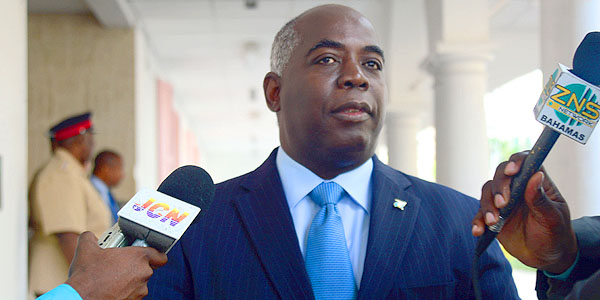Statement on BEC by Deputy Prime Minister Davis

STATEMENT:
Mr. Speaker
Ahead of the Progressive Liberal Party’s election to Government, by our Charter for Governance, we clearly stated that one of our critical initiatives to change the economic course of the country would be to find ways to reduce the cost of electricity. We stated that the cost of electricity throughout The Bahamas is simply too high, causing untold hardship to families, making the country uncompetitive in many business areas, and stunting economic development.
In August of 2013, Prime Minister Christie released a statement announcing the Government’s intentions to reform the energy sector with the following objectives:
· To provide energy supplies to consumers that will meet long term growth demands for energy
· To increase international competitiveness in production in order to promote economic development and job creation
· To utilise economically viable renewable energy sources to promote environmental sustainability
· To provide long-term energy security to producers and consumers
· To increase Bahamians’ awareness of energy, its use, and conservation methods in their daily lives
· To increase energy efficiency
· To provide modern and expanded energy infrastructure
· To create a regulatory framework that promotes transparency, investment, competition, efficiency, and public-private partnerships
· To foster sufficient flexibility that adopts and adapts to new energy technologies
· To establish an institutional framework with high levels of technical capacity to support and facilitate the implementation of policy by all stakeholders; and
· To provide investment and business opportunities with spin off benefits to other sectors.
Mr. Speaker
With the establishment of the National Energy Task Force, that body set the path to ensuring that 40% of the Bahamas’ energy needs come from renewables by 2033. Strategic innovations therein provide for fuel diversification, infrastructure modernisation, renewable energy source development, conservation and efficiency. It also includes a table for target evaluation and monitoring. In keeping with the policy, Government, in consultation with the private sector and civil society, will develop three (3) year action plans to enable the development of key actions to support the strategies articulated in the policy document. The conclusions of the National Energy Policy supported the amendment of the Electricity Act, key to our “heavy lifting” legislative agenda.
Mr. Speaker
I am pleased, now, to advise this honourable House that the Electricity (Amendment) Act, 2014 came into effect on Friday past, that is, 20th March 2015. The Act enables persons to install and operate renewable energy generating stations, which can be connected to the electrical grid. The Act further provides for the registration and regulation of such stations.
Passage of time and focused determination have given witness to revolutionary legislation that advances us into a renewable energy age for The Bahamas. We fully expect the reawakening of our entrepreneurial spirit as regular citizens become empowered to produce energy for themselves and others through the grid tie connections.
This entrepreneurism is facilitated by the provision for the Residential Energy Self Generation Programme (RESG), which gives diverse benefit to consumers. This deliverable of the National Energy Policy was animated by the Electricity (Amendment) Act. Though The Bahamas’ dawn for the Renewable Age lags behind global trends, we have been judicious in our approach to catch up by empowering our citizens to become independent power producers. With the RESG Programme, the opportunity exists to generate energy through alternative energy sources, tie into the current electrical grid, and to receive a credit for excess electricity fed into the grid.
Mr. Speaker
This is a great time in our history because, for renewable technologies, we have created new opportunities for jobs including manufacturing, project development, construction and wind turbine installation, operations and maintenance, transportation and logistics, and financial, legal, and consulting services. We look forward to entrepreneurs seizing opportunities to take on workers for solar installation, manufacturing, and sales.
Everything comes in its due season. Renewable technologies are not beyond the reach of average citizens. Government has eliminated tariffs on inverters for solar panels and LED appliances to ensure that more of our citizens would be able to afford these energy saving devices. We are also witness to a time when the costs of renewable energy technologies around the world are declining steadily, and are projected to drop even more. For example, in the United States, the average price of a solar panel has dropped almost 60 percent since 2011, and the cost of generating electricity from wind dropped more than 20 percent between 2010 and 2012 and more than 80 percent since 1980. Globally, field experts are unified in the expectation that the cost of renewable energy will decline even further as markets mature and companies increasingly take advantage of the modalities.
Mr. Speaker
Having documented our Energy Policy, having passed the Electricity (Amendment) Act to effectuate that policy, I now present a summary of provisions of the Electricity (Renewable Energy) Regulations, which I will lay on the table at the conclusion of this Communication. Subject to the Act, these Regulations provide the prescription for approving the generation of energy from solar and wind renewable sources by facilities, as well as the prescription for permitting renewable technologies – namely solar water heaters and electricity generation units. In respect of facilities, they further provide for their registration, certification and de-certification of facilities, connection and disconnection from electrical grid, and enumerates substantial penalties for offences. These penalties range from
· Fines up to $25,000 for contravening Section 15A of the Act in respect of facilities; with further fines up to $1,000 per day for continuing offences; and
· Fines up to $5,000 for contravening the Regulations; with further fines up to $750 per day for continuing offences.
We believe that the prescribed penalties will sufficiently encourage conformity with the legislation. The Regulations will come into effect on publication in the Government’s Gazette.
Mr. Speaker
With the basic legislative agenda just about in hand, we have but one Executive detail to conclude. When we came to office, this Government foreshadowed the realignment of the Bahamas Electricity Corporation (BEC), which generates and distributes in most parts of The Bahamas and is an imperative to real electricity sector reform for our nation. The cost of power generated by the Bahamas Electricity Corporation was pegged at 40 to 44 cents per kilowatt hour (KwH). This compared to production rates in the USA at 12 cents, China at 11 cents, Canada at 8 cents, and Trinidad at 7 cents. Simply put, we are taking aggressive steps to lower the cost of electricity as the cost of importing fuels remains a massive drain on our country’s resources. This is the evidence upon which we resolve a long term redress to the cost of power issue.
Since coming to office, on our own, Government has sought to reduce operational costs at BEC by improving on operational efficiencies and reducing waste, wherever possible. We eliminated the excise tax on fuel used by BEC in the 2013-2014 budget; and, a loan was approved by both Houses of Parliament in the amount of Two Hundred and Fifty Million Dollars (B$250M) to rehabilitate and improve the Corporation’s financial position.
Mr. Speaker
At the moment, we all welcome some relief in the form of lowered costs for electricity purchased from BEC. This is directly attributed to the cost of fossil fuels falling, but we do not know how long this will last. BEC generates by gas turbines, which are costly to acquire and maintain. Retention of these turbines has also contributed to the environmental degradation of our beautiful islands because of the fossil fuel used to operate the equipment. Notwithstanding the diligence of duty at the Corporation, the fact is that the energy provided by BEC can be unreliable at times. As recently as Friday, 13th March, we experienced the second protracted island-wide blackout in the course of one year.
It is well-known that Government has also engaged the process toward identifying a strong, technically capable and experienced company to manage a new BEC. This management company will have significant autonomy and operate subject to a business plan which addresses the specific objectives of Government within the frame of the new Electricity Act and the National Energy Policy. I have previously communicated to this House that we will seek to cause the business model to basically mirror that which the Nassau Airport Development Company (NAD) has for the management of the Lynden Pindling International Airport (LPIA). Corresponding to the airport arrangement, Government commits to 100% ownership of BEC.
BEC will remain fully owned by the people, though fully managed by a company that can guarantee the reduction of the cost billed to the customer by up to 30% immediately following the commencement of the contract, given the all-in-cost base of average 40 cents per KwH. When these reflect onto The Bahamas at large, this reduction will save business and residential consumers close to B$200 million.
Mr. Speaker
This administration has set out on the journey to totally reform the energy sector of The Bahamas. This journey is not short and must be continued across administrations until we arrive at a desired destination. As a Government, we are doing our part. Change will come to positively impact cost, reliability, efficiency and environmental sensitivity.
But this change, which will secure our energy future, can only be achieved with a concerted effort from the public and private sectors along with every single resident of this nation. This change will provide the opportunity for gainful employment and entrepreneurship for Bahamians. More and more energy service companies are being launched to participate in the energy conservation and renewable energy industries.
Mr. Speaker
Energy sufficiency is essential to our way of life. It provides us with comfort, transportation, and the ability to produce food and material goods. As a Government, we are satisfied that we are on the right track to the sustainable development of our Bahamas. It is on that premise that it has been my pleasure to table the Electricity (Renewable Energy) Regulations, 2015 and Electricity (Amendment) Act, 2014 Appointed Day Notice.
Thank you, Mr. Speaker.




![A Con Artist [RACIST] wants Bahamians to fight progress – WELL, WHAT IS THIS?!](https://www.bahamaspress.com/wp-content/uploads/2025/07/Toby-Smith-218x150.jpg)


